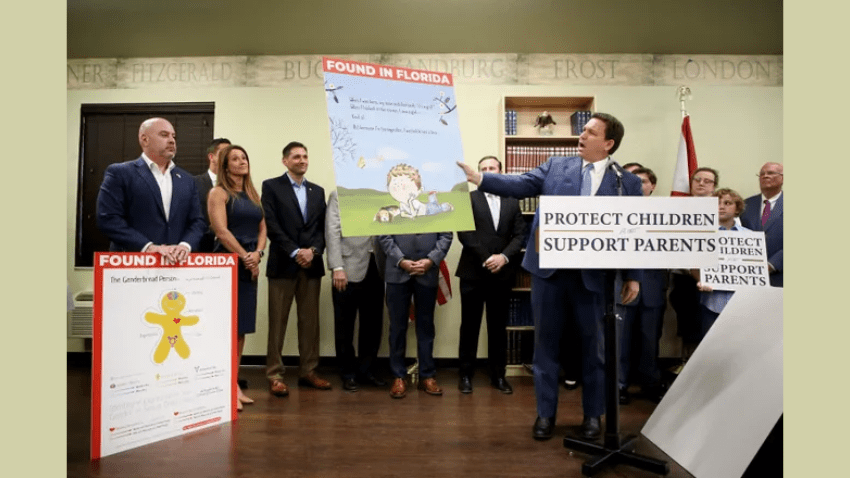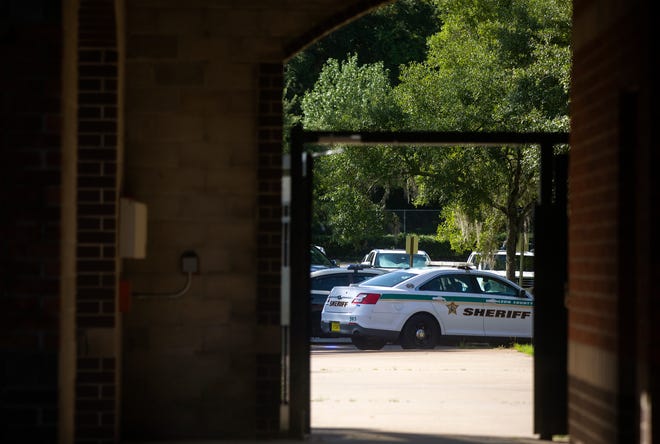
Matter of safety or invasion of privacy? How new policy on cameras plays out in LCS schools
Tallahassee Democrat | By Ana Goñi-Lesssan | October 11, 2022
Leon County Schools attorney Will Spillias said he received calls at the beginning of the school year from principals concerning the district’s recording policies.
Students were coming to class with recording devices in their backpacks, said Spillias at the lectern to the Leon County School Board.
“Their parents (were) saying ‘Hey, you can record,’ and I don’t know if they threw out the parents’ rights or the student rights’, whatever, but my advice to them was no,” Spillias said.
There was no policy at the time, but a new rule that would not allow students to record audio or visuals in class was one of several new policies brought forth by the superintendent at Monday’s agenda meeting. The policies include cameras in the classroom, the review of instructional materials and challenging the content in school textbooks.
Over the past year and through the COVID-19 pandemic, the district has had to modify and sometimes even strike several policies in response to legislation, specifically the Parents’ Bill of Rights and the Parental Rights in Education and Individual Freedom laws.
“After the legislature every year, policies are updated or new policies are created to ensure that the school district is aligned with state statute,” said Superintendent Rocky Hanna. “We have really worked hard over the course of the last year and a half.”
Florida law states people in a kindergarten through 12th-grade classroom have a reasonable expectation of privacy and recording someone else during a conversation without their consent is a felony.
The district’s new policy states recording instructional time in a classroom by a student, parent, the public, or media, however, is always off limits, but would allow cameras in a classroom if there is a “safety concern.”
Cameras are already in outdoor spaces and indoor common areas. The clause discussed states: “Video security cameras may not be used or placed in offices, classrooms, laboratories, or any indoor location where students are receiving instruction, unless required for safety reasons. The Superintendent shall approve the placement and use of security cameras in these locations when there is a safety concern.”
Superintendent Rocky Hanna said if there is a classroom with students with violent tendencies or if there are emotional or behavioral issues, to protect students and employees against allegations of misconduct, a camera could be placed in a classroom for safety.

In 2021, the legislature passed a pilot program allowing cameras in Broward County Public School classrooms with students with disabilities. A parent can request the installation of video or audio equipment if a student has an individualized education program, or IEP, which places them in a “self-contained” classroom, according to the district.
For Leon County, the superintendent would have to sign off on the camera in the classroom after hearing from the site administrator and the chief of safety and security.
“Sometimes we have situations where things happen in the classroom, and employees are accused of doing things that are simply untrue,” Hanna said at the meeting. “I think in isolated situations, cameras in a classroom could help first and foremost protect the students there in the room and then also protect our employees.”
The new policy states that cameras are allowed where there is no expectation of privacy, like at sporting events. Teachers and staff are also allowed to record in classrooms for educational or administrative purposes, like lesson plans or accommodations for someone with a disability.
Cameras in locker rooms, restrooms or any other location where students or staff could be in a state of undress are also prohibited.

Which materials will be reviewed under new law
The district’s response to House Bill 7, known as the “Stop WOKE Act,” and House Bill 1467 is requiring all instructional materials to be reviewed by a certified media specialist.
According to HB 1467, now law, the district must implement a formalized process to handle a complaint with regard to instructional material and allow parents to review learning materials and contest them if they consider them inappropriate.
It’s not just books for English literature classes that need to be reviewed, either. State law includes library books as instructional materials, according to Shane Syfrett, director of professional learning and curriculum services.
“Okay, so this would include the ‘Junie B. Jones’ books?” asked school board member Alva Striplin during the meeting.
“Absolutely,” Syfrett answered.
Starting in January of 2023, any new library books will have to be approved by a certified media specialist. The state is currently creating a training for media specialists to teach them how to approve the instructional material.
“So if Godby had a book that was purchased before then, and Lincoln got it after them, only Lincoln would have to get it approved and Godby would not?” asked Striplin.
“Correct,” Syfrett added. “We have to start somewhere.”
Currently, each school has its library books listed on its websites, so parents and the public can see what students can access.
If a parent or a member of the public challenges the adoption of a library book, they can file a petition with the principal, and the school must contact the complainant within 30 days.
If the person is unsatisfied with the principal’s decision, the district will set up a meeting. Finally, if the person still doesn’t agree with the district’s response, the complaint goes to a hearing officer, who will have 14 days to make a decision.
The district is looking into asking local experts, like university professors, to act as hearing officers.
“I don’t want to jinx us, but leading up to this year, there have not been, to my knowledge, there has not been a challenge that has gone all the way to the school board for a final decision,” said Assistant Superintendent Billy Epting. “Typically, problems have been solved at the school level.”
The process for challenging instructional materials at the county level, like state-approved math books or science books, is about the same, except the committee includes community members, and the parent or member of the public only has 30 days to file a petition.
Earlier in the school year, the district asked teachers to submit supplemental materials that aren’t in the state-approved textbook for prior review if the materials deal with a controversial subject.
“We don’t want principals to be caught off guard, and we want to provide some protection to classroom teachers,” said Epting in early August.
So far this school year, only one book has been challenged in Leon County: the Bible.





